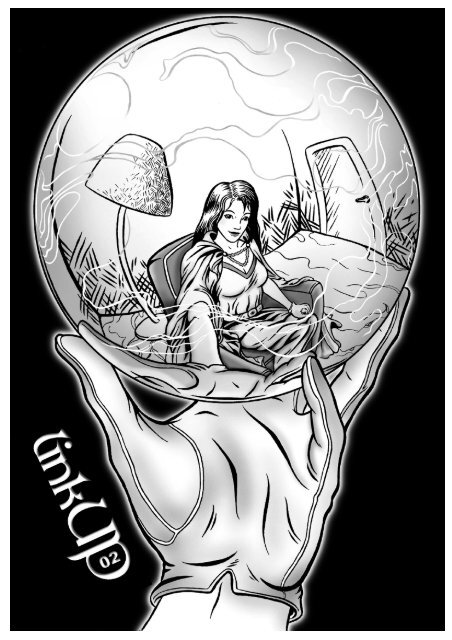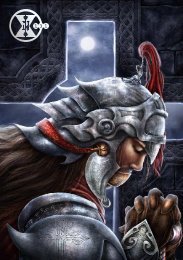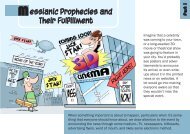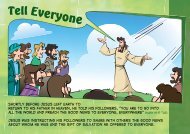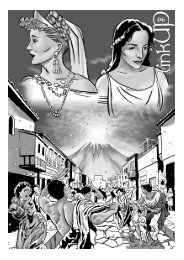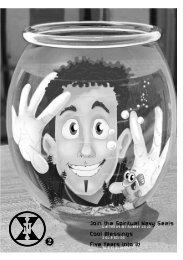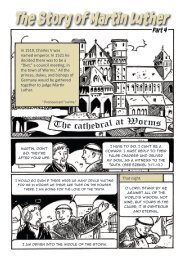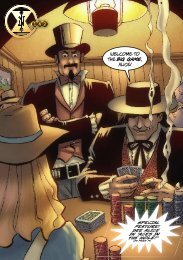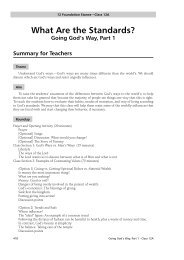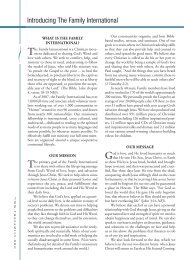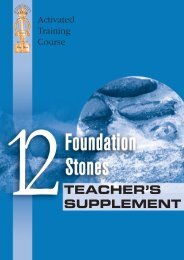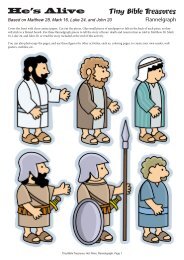TFI Online
TFI Online
TFI Online
- No tags were found...
You also want an ePaper? Increase the reach of your titles
YUMPU automatically turns print PDFs into web optimized ePapers that Google loves.
ForormerPlayboyboy y BunnTalkalks About Sexand Salvation2My name is Ann, and I was what youwould call a high-class hooker. I made loveto a lot of men in my life. I had a lot ofgood times, but I also saw bad times. I knowwhat it’s like to have lots of money and whatit’s like when times are rough. I had thelooks, and those looks got me a lot of placesand bought me a lot of pretty things. Butafter a while the accumulation of thingsbecomes meaningless. The only thing I cansay about things is that they give you adesire to have more things! You’re neversatisfied; you always want more.I was one of those girls that enjoyed myprofession. I liked sex. I liked making love.I liked men. I pretty much had my choice.I’ve seen handsome ones and I’ve seen richones. Although I had times of happiness, Iwas never truly satisfied, never truly happy.I got lots of compliments about my goodlooks and my figure, and I appreciated that.But I seldom received comments for me, thereal me inside that nice figure and prettyface. That can get to be a very depressingand discouraging fact of life.I noticed through my years and throughall my acquaintances and men friends, thatthe heart of man everywhere is the same.Though a casual time of physical love andaffection is nice for the moment, it doesn’tlast, and it won’t satisfy you completely. Itwon’t fill the emptiness in your heart thatGod put there for Him to fill.
I didn’t learn that until afterI died, but I did believe inJesus. You know, some of us[Playboy] bunnies are likewhat Jesus said about the harlotsin the Bible, that they willenter into the Kingdom ofHeaven before some of theseself-proclaimed righteouspeople. I knew I was a sinner,but He loved me. I had myweaknesses and my shortcomings,but I knew sincerity andgenuineness when I saw it.MamaYou know, the kind of lifestyle that I leddoesn’t afford a long career. It’s a competitiveworld, and young bodies and new beautiesare always coming into the profession,squeezing you out of your place. I lastedlonger than most though, maybe because Ihad a strong personality, and didn’t lack theguts to tell people what I thought. I didn’t letmyself get pushed around.But my life didn’t last very long. I didn’tmake it past the age of forty. It never wasclear what I died of, but my body just beganto weaken and degenerate. The doctors saidit was some type of nerve disorder or paralysis.God must have known that my time wasup, and He wanted to spare me the rest of anuneventful and disappointing life. He broughtme into the spirit world, where He taught meabout Him and His love, and I learned moreabout the God that I had loved as a child,though I didn’t know much about Him.I’ve learned a lot since I’ve left Earth andentered the spirit world, but actually, I firstlearned about Jesus and what He was like,on Earth. I met a man who loved Jesus. Maybeyou think, “What was a man who loved Jesusdoing with a Playboy bunny?” Well, that’swhat I wanted to know. What was he doing ina Playboy Club? He was a traveling salesman,passing through town on business. Icould tell he was lonely. We struck up a con-Isn’t that amazing? You never know how muchyour witness will change someone’s life. Ofcourse, in the Letters, Dad did talk about thevarious nightclubs that he went to, and the girlsthat he went out with while he was on the roadas a salesman for Fred Jordan. Since I couldn’tremember whether Dad had ever mentioned thisspecific instance to me or not, I asked him ifhe’d like to say anything about it. Here’s hisanswer:Yes, Ann is one of myconverts! Praise the Lord! Ifirst met Ann in Los Angeles,where I was on a shortbusiness trip for Fred,booking his “Church in theHome” TV show. There weremany lonely nights when Iwas travelling, away fromEve, sometimes for up to twoor three weeks at a time. Solike I’ve told you in theLetters, I went out and foundmyself some company! Shewas a sweet girl, but emptyinside, like so many are whodon’t know the Lord. Wedidn’t spend a long timetogether, but as was myhabit, I always tried to givethe girl a witness, and atleast tell them how much theLord loved them, and howthey could find a place inHeaven.—And Ann acceptedthe offer! It’s been wonderfulto meet not only her, butcountless others whose liveswere rerouted to Heaventhrough what I considered tobe a simple witness. Younever know how far yoursample will go, folks! Don’tunderestimate it!Dad3
versation during the evening and then madean arrangement to get together.It was one of the most unusual experiencesI’d ever had. Here was this man in my bed,and after we made love we were talking, andthe conversation led to a discussion about religionand Jesus. He told me that he wasn’t achurch-going Christian, but that he believedin the Lord, and that God was love. Now Iknow that he was right, because now, I’vehad the chance to learn more about Jesusand His love myself.He was a man of God. God hadcalled him for a special purpose,although I don’t believe he yetknew what his mission was. Buthe soon found out, and I knownow. His name was David,and he ended up foundingthe Family you now areblessed to live in. Isn’t thatamazing?Through that one-nightstand a seed was planted inmy heart. I don’t know if thisman intentionally did this, orhow the conversation even cameabout, but I never forgot what hesaid, and I owe my life to his faithfulnessto offer me salvation.Now, I’ve learned so much moreabout the truth. I’ve learned that love isthe most important thing, and that thereis nothing wrong with sex, or with awoman being beautiful—you just haveto keep it in its proper place. I’velearned that using your body for selfishreasons, for material gain, toglorify yourself, well, that’s notright, that’s not good. But toglorify God and to conveylove to others—there’snothing wrong withthat. It’s the exploitationthat is wrong, but4natural beauty and sex in itself isn’t wrong.So the next time you make love to yourwife or husband or lover, and it gives you greatjoy and you feel so secure, know that this securityand joy and happiness you feel is ablessing from Jesus. It’s His love for you, aphysical manifestation of what you can havein your spirit eternally by receiving Him intoyour life and heart—one eternal, non-endingorgasm. Ha! I’m sure that got your attention.Actually, it’s the best way to describelife with Jesus and His love—anunending, eternal orgasm!Hugh Hefner’sPlayboy Enterprisesopenedthe first of itsPlayboy Clubs inChicago in 1960.The clubs offereddining and“male entertainment,”andfeatured femalestaff membersknown as Playboybunnies,who weredressed in revealingoutfitswith bunny earsand cottontails.
pSpirit StuffQThere have been reports of flying saucers(UFOs) being sighted. Are they real? Arethey aliens or angels flying around?My spirit beings, those on both the side of good and evil,travel in this form, as this is a means of travel that is beyondhuman comprehension. But do not fear them, for nothing canharm you. The Evil One has great power, but his power is minimalcompared to My angels and My guarding, protecting police force.However, there are men on Earth who have studied and learned,and have developed similar methods of transport. But they arekeeping it top secret, for this will be one of the devices of the Antichrist.He will come with signs and wonders, and this will be one ofhis wonders. This will make people look to him in awe, thinking thathe may be superhuman, “out of this world.” Their minds are beingprepared to believe in the extraordinary, the superhuman, the superrace.5
As told by AlbertPierre was my lifelong friend. He wasjolly and adventurous, and we’d spentthe happiest days of my life together. Butgoing to see him today was different; Iknew that I’d most likely find him thesame way he’d been for months—melancholy,nervous, and in pain. Pierre, mybest friend, had cancer. I could hardlybelieve it. I didn’t want to believe it, but itwas true. He was slowly dying, gettingsicker and sicker, and I felt I was dyingwith him.As we drove along the river toPierre’s house that day, I thoughtabout what the doctor had said:Preliminary tests had shown my bonemarrow could save his life. I wasfeeling selfish, cowardly, and like ahypocrite. I felt my manhood wasbeing tested, and the last thing Iwanted to do was have some doctordigging my bone marrow out. Thescience of bone marrow transplantshad not yet been perfected, and therewere risks. But how could I even thinkof denying Pierre? What was wrongwith me? Any man in his right mindwouldn’t hesitate to help his bestfriend, even to his own hurt. I wastormented by the thought of nothelping Pierre and later having to livewith the guilt, yet enduring torment atthe thought of going through with theoperation and feeling the pain.We soon passed by St.Augustine’s Church. Somehow, justseeing something that reminded meof God made me utter an inner prayerfor His guidance. But if I go aheadwith this thing, God, what if somethinggoes wrong and I end up crippled?How can I be sure that I can trust Youto protect me? What if…?I had tossed and turned on my bedthe entire previous night, mulling overthe pros and cons, imagining the6
worst possible thing that mighthappen to me if I went ahead with thistreatment that could save my friend’slife.In the morning, I was no lessconvinced that the worst might nothappen to me, but I’d come to feelpeace about giving it a try. I had to bewilling to give what I could to help myfriend. I chose to put my life in God’shands. I figured God was big enoughto take care of everything.That day, Pierre looked the sameas he had for months. Everythinglooked the same on the outside—thepeople in the park, St. Augustine’s—nothing had really changed. Yet I feltdifferent. It was as if a big wave ofanticipation welled up inside of me,and I was on the edge of somethinghappening.I agreed to the operation. However,the doctors found out that my bonemarrow wasn’t the right type after all.I was disappointed, because I reallywanted to give anything I could toIt wasn’t up to meto save his life...help him. But Pierre never stoppedthanking me, and even though wedidn’t get the miracle we had hopedfor, it gave Pierre something evenbetter, because he knew I truly cared.His face would light up every time Icame in the room; he was happierdespite the pain.Imagine if I hadn’t chosen to gothrough with it. Pierre would havenever known how much he was loved.It wasn’t up to me to save his life; itwas just up to me to do what I couldfor him. That was all it took to givePierre what he really needed. Heneeded to know that I was a caringfriend who was willing, despite risks,to give whatever might help to savehis life.I was tormentedby the thoughtof not helpingPierre and laterhaving to livewith the guilt7
Master ofSLAVES8My name is Louina KayKlowke, but everyonealways called me Lina. I grew upin southern USA, in Louisiana,around the New Orleans area. Mydad was considered wealthy forthose times, and we had a lot offarmland. I lived in the years justprior to the Civil War, before theliberation of the slaves. We werewhite and they were black—veryblack.We had farms, we hadplantations, and we hadslaves, plenty of them. I hadmy own slave or attender, aswe often called them. We musthave had close to a hundredslaves working our fields andfarmlands, and they were allblack. No good white personwould have been caughtworking alongside the slaves,even just to lend a hand.My parents were goodfolks, kind and courteous, butthey stayed separate from theslaves as best they could. Mydad, though, had a heart forthem. He’d been through somerough times when he wasyounger, and came close tolosing his land a few times,so he could relate in his ownway to theslaves havingno place tocall theirown, really.He tried to begood to theslaves whoworked ourland. Theyhad theirhomes, theirhuts, and theyeven had sometime off. Theyhad done wellfor themselves by catching amaster like my dad, ‘causethere were some othersaround—even our neighbors—whoweren’t nearly askind, and who worked someof their slaves to death. Someof them even put a few of theslaves’ little ones “out of theirmisery,” as they said.It was heartless, really,and it only served to turn theremaining slaves moreagainst their masters. Butthey were so far removed fromtheir workers, that theycouldn’t smell the smoke coming.We didn’t worry muchabout them. What could wedo? They were grooming theirhorses to take them to theirown funeral, which in time,they sure did—in a real gallopingsort of way.Come to think of it, it wasthe gruesome murder of a certain“white lady” that put mymom in a shock that she nevercame out of. What happenedto our neighbors—theCornells—was that finallywhen the Master of the housewas off on trading business forsome days, Mrs. Cornell gotup to her usual antics, tryingto clean up and rehabilitate“those dirty folks” as shecalled them—even to theirfaces. I’m sure there wereplenty of folk who thoughtnasty things about theirslaves, but they had the sensenot to say ‘em, at least not ascruelly as was her habit.One black family hadn’tquite finished their chores ontime, and that gave their taskmastersomething to lord overthem—as if that was anythingnew. She deprived them oftheir food, which wasn’t afirst, but this time they didn’ttake it in much of a docile*way; their child was very ill,and they needed the food. Theypleaded, they tried to explain,but she just marched off cursingat them. They finally gotthe head maid to come anddocile: yielding to supervision
look at their daughter, to seehow sick she was, and toplead with Mrs. Cornell ontheir behalf.Katie Bulwine was anolder white woman, but sensible,thankfully, and she’dworked as the go-between formany a rich family and theirpoor, black slaves. She wastheir last hope, and Katie didthe best she could for them.She appealed to Mrs. Cornell,but there was no softening thatheart of stone. She was set tokill their daughter, and fromwhat Katie told me later, onceshe heard just how ill the littleone was, Mrs. Cornell almostglowed with an evil aura, determinednot to allow anyoneto hinder the evil work she’dbegun.Mrs. Cornell saw the sympathyin Katie’s eyes, andkeeping a jump ahead of her,ordered Katie off to a nearbytown with one of the men servantson a two-day trip. It wasobvious what she was doing,but she was not about to becorrected or reined in. Shemarched Katie rudely to thecarriage, and stood there tillshe was off, hardly even readyto go, but more awfully, withoutany reason to go or purposefor the trip. It was all tokeep Katie from feeding thatlittle girl herself, which shewould have done, bless herheart.Mrs. Cornell had to havelost her mind. What on earthwas she thinking?—SendingKatie off with two of hertrusted men-servants, and theMaster already gone. She cutright down her whole protectionforce, but I imagine noneof those thoughts even crossedher mind. She had her slaveguards stationed in front ofher little palace, but theywere bought off just by thestory of the poor black manand his wife—both slaves,both crying with a dying childin their hut. Getting help fortheir revenge was not a problem;all the slaves were withthem.The story that circulatedamong the slaves was that theparents of the dying child hadGetting help for their revenge was not aproblem; all the slaves were with them.gone into the big house to getfood for their family. Mrs.Cornell would never know thedifference, since she didn’tknow what amount of suppliesthey had on hand, except thatwhen Katie would inform herthat they possessed surplusgoods, she never would allowit to go to the slaves.“Let it go to waste, as itwould in its natural environment,”she would simply andcoldly instruct.The next morning, I’msure, there was plenty of foodmissing from the Cornells’cupboards, which they wouldnever miss. And I find it hardto believe anyone would havenoticed the other thing thathad gone missing either, butwhen Katie arrived home, shestumbled upon Mrs. Cornell’sbody. She was dead, and hadbeen given no mercy in herdeath. It was gruesome, andall the blackness which shehad ever cast on the poorslaves now rested on her. Mrs.Cornell’s body had laid therefor nearly two days, and it wasno pretty sight.When the Master gotword, he came home immediately,and was thankfully toolate to see the mess or smellthe stench. The slaves werepunished all right, and theguilty couple was prepared fora harsh beating. For all theyhad been through, their spiritshad a way of putting upwith the unbearable. Theirlives were saved by the factthat no one could ever reallyknow who did it. Katie didn’tlet on, and of course, none ofthe slaves talked, and theMaster needed his slaves. Solife—bad as it was for them—went on.When my mother heard ofall this, upon Mr. Cornell’s returnhome and with the funeraland all, she went intosuch a state of shock that she9
never quite came out of it. Shecouldn’t believe that a whitewoman, so much like herselfon the outside,couldhave beenmurdered socruelly, andso close by.Perhaps thatwas the mostfrighteningpart. Shedidn’t havemuch of arapport withour slaves, and she was overtakenby fear. From then on,she kept holed up on the topfloor of our mansion. Not aslave was allowed on the topfloor, nowhere near her, so ourhead maid had to become herfull-time attendant, for shewould have no one else.It was frightening for uschildren, and Father seemedto just ignore it. I think hedidn’t know how to handle it,and was perhaps concernedhimself with the whole situation.I noticed that he triedharder from then on to begood to our slaves. He startedcalling them “our people,”and they seemed to like thatall right. There was a greatelement of respect and distancebetween them and Father,so you could never reallytell if they liked him ornot. Of course, why wouldthey? He was their master,after all; thus, they had nofreedom.10She couldn’t believethat a whitewoman, so muchlike herself on theoutside, couldhave been murderedso cruellyand so close by.It was all very consuming,and some years passed beforethe topic was raised again,and I askedKatie whathad become ofthe little girland herhealth—theunderlyingcause of themurder. I hadalways supposedthat shehad died. I wassurprised andhappy to hear that the littlegirl had lived. I soon resolvedto find her and befriend her.I think some of that anger gotinside me, as well, over thewhole incident. She becamemy first black friend. Hername was Saffra, and shechanged much of my mind.She was younger than me byabout six years, but for allthat she had been through,living the life of a slave, sheseemed to hold no less wisdomthan I did.She changed my wholeperception of slaves and coloredpeople. I hadn’t beenunusually harsh or cold towardthem; I just acted theway I was raised, which wasfairly tolerant. But as Saffraand I became closer friends,I saw there was no difference;just she was bound and I wasfree, that’s all. We both knewthere was no way that I wasgoing to be the one to changeall that, though there had alwaysbeen talk of revolutionand freedom among theslaves. And through our acquaintance,I surely was morein favor of it by this time. ButI knew that we needed to treatthem better, as friends, aspartners, as workers, providingthem with more benefits.I talked this over with myfather, and he, being thegood-natured man that hewas, after much thought,agreed to allow the slaves topurchase their own land andhomes on his properties. Hebasically gave them wages,though small, and they wereoverjoyed. You could even seehints of a smile here and thereas he walked by them. Theywere happy. But we had anagreement: We kept this veryhush-hush. We didn’t tell ourneighbors, and our workersdidn’t tell anybody either, elsethey would lose their privilege.We just couldn’t riskhaving the whole white communitystorming us for startingsuch a horrible trend.Mother never knew about iteither, for she wasn’t in on thediscussions. She was still ina daze, and became more reclusiveby the day.This went on for years, andSaffra and I spent as muchtime together as we could,without her being too missed.Her parents were good aboutit and would cover for her,and after Mrs. Cornell’sdeath, the Master got a bitsloppy in his taskmaster du-
ties. He spent most of his timeaway from their property, doingbusiness elsewhere, Ithink so that he wouldn’t haveto be confronted with thememories that the housebrought back to him, and nowonder. They could have beennothing short of horrid.Then came the day thatthe slaves rebelled. They wereturning to force and violenceto get revenge on their masters—atleast some of them—but mostly to obtain their freedom.We had heard of slavesviolently attacking their masters,even in a much largerway than we had witnessedwith Mrs. Cornell’s death.Then it happened to our town.A large group of slavesescaped from their farms andplaces of work. Embitteredagainst their taskmasters andany like them, they were ravagingthrough our country-11
side. They attacked, destroyed,beat and killed,bringing with them a waveof destruction that you couldfeel as hot as the burningsun. The resident slaves wereleft untouched, but the mastersof the land and any whiteinhabitants were sought out.By the time we heardword of it, there was nothingto be done. The large bandwas upon us, and it seemedthere was no escaping. Therehad been no warning. Wewere set to be destroyed alongwith our lands, for the clatterof their horses and shoutscould be heard in the distance.Then came the loudknocking at our front door.Father looked over as wethree children were headingup the stairs; it seemed hewould not open it. The lookin his eyes said, “Break itdown if you will!” But I lingeredfor a moment.“Father, the knocking isdesperate, persistent! Allowme to open it.” Without aword, Father went instead.To all of our surprise,Ruth, one of our workers,stood at the door. They werenot allowed to knock on thedoor, or at least they neverdid; it was just an unspoken12rule.With boldness in her voice,though her hands were trembling,she reached out andtouched Father. “Come withus, all of your family. We willhide you!”Father’s expression betrayedhis shock.“Now there ain’t no time“Quiet down, girl! Your panic isgoing to get us all caught!”for that,” Ruth said, andlooked toward me pleadingly.I grabbed the hands of myyounger brother and sisterand pulled them quickly outthe door, tugging on Father’scoat as I went by. He followedus, then paused as if thinkingof Mother upstairs. Ruthhad already thought of her,and said, “Master, I’ll sendsomebody strong to fetch her.You come with us now.”Those were bold words fora slave, but Father said nothingagainst them. We wererushed by Ruth to a clump ofhuts a ways off, heading inthe direction of the oncomingterror. We were split up andtaken into two different huts,where our workers—theslaves to whom we were masters—hidus. One of us wasstuffed under a rugged bed,with a blanket, thinning inparts too numerous to count,thrown over the side. Anotherwas put in a wooden boxmade of slats, then covered bywhatever kitchen utensils thehut afforded them. Father wasput in the tool shed, pressedagainst the wall behind thedirty work clothes. I was smallin stature, and since therewere no more conceivable hidingplaces in these bareabodes, I was put in a bedwith a large black mother,who wrapped her few blanketssnugly around us, andbegan rocking back and forthas if I were her little babe.I could hardly breathe.The noises and shouts of theapproaching band were drawingcloser, and it was onlythen that I realized the desperatenessof our situation.Their hiding us was so risky.Not only could we be foundby anyone who cared to givethe huts a second look, but ifwe were found, our workers’lives would be placed in thehands of certain death. Theywould be inevitably seen astraitors and would die, alongwith us, on the spot. My heartbeat faster and more furiously,until my hiding placesqueezed me and said, “Quietdown, girl! Your panic is goingto get us all caught!” Itried to obey and settle myselfthe best I could.Then they entered ourproperty. From the sounds wecould hear, I made out ourfence being broken down, ourtins and storage cans beingknocked over, and I listenedcarefully for the rush of fire
through our fields, but did nothear it yet.The creak of the hut doorswinging open sent a chilldown my body. “Who’s incharge here?” a rough andbitter voice demanded.“I am!” Ruth’s husbandspoke up, indicating that hewas responsible for the two adjoininghuts where we wereall stashed. They stepped outof the hut and the conversationquieted, till we could notunderstand the words, butonly heard their voices. Itseemed to go on for an eternity.“Men, listen on up here!”Again I recognized the samebitter voice that had demandedto know who was incharge. He was speaking tohis men, who must have notyet dispersed into destroyingour land. “Our brothers heresay that the masters of theland are not at home; luckyfor them they are away. Wehaven’t the time to baby-sitthe house and await their return,so we’ll leave it in thehands of these good brothersto do the dirty work for us,which they’ve agreed to. Othermasters await our vengeance,now don’t they?” he calledout, and a shout of assentflooded the air.“But,” he added with anote of cheer, “there is stillthe house and grounds to bedestroyed! We brothers willstill leave our mark!” Anotherround of cheers and soundscame up from their rowdyband. I shivered. Then Ruth’shusband, who I suppose hadstood beside him during thisspeech, called out, “Wait, mybrother! If you would haveyour men wait just a moment,I have an important word tospeak with you.”The respectful tone in hisvoice seemed to rather pleasethe leader of the rioters, andhe gruffly instructed his mento remain in position until hereturned. I heard a grumbling,but soon enough thedoor creaked open again, andRuth’s husband and theleader were in our hut. Theysay he looked around for a momentat the scanty dwellingplace, then spotted the mamalying on the bed, holding abundle about her body.“What’s that there?” hequestioned.She spoke up with a deepvoice that said she knew morethan he could ever hope toknow about these sort ofthings, “Son, I have a childhere, not a young one, butshe’s my child no less. I’mhaving to warm her with mybody for the safety and healthof her young life. Now bequiet in your talking and keepthe door shut; there’s a draftblowing through here.”She knew how to put ayoung man in his place, andalmost respectfully, he walkedup to the bedside and laid hishand on my back, giving it agentle pat. I shuddered sohard he must have felt it.Then he said, “Ma’am, I hopeshe is well.”“Oh, she will be well. Shewill be very well.” She then13
turned and gave the topof my head, which wascovered entirely by theblanket to keep my ashblondehair out of sight,a motherly kiss.Then his gaze musthave turned towardRuth’s husband, whoinstantly began explaining,“Sir, naturallyI would have noobjection to your menravaging the grounds,destroying the house,taking what you would,for all these goods andluxuries have been keptfrom us for such a verylong time. I understandwith all my heart thefeelings of deep resentmentthat run amongyour boys.”“So you wish to join us inour destruction?” he asked.“Ah, you see, if we burnand destroy, then we willnever lure the masters of ourland back. For they will certainlysend someone ahead ofthem to prepare the house,prepare the food—all thatmaster stuff—and once theyhear word that all’s been destroyed,they’ll never set foothere again. They have somuch. The loss of one piece oftheir land is hardly punishment.“Brother, the slaves herewill assuredly agree with meand give me their full cooperation.Leave the house andgrounds be. When we hear14word of their arrival, we canthen have our way with thegrounds, with the crops, withthe house. We can destroy itbefore their very eyes; we cando whatever we like. Yes, theyhave been our masters, andwe have been their slaves,and I am sure that on this entireEarth, they have beenmasters like no other slavehas ever had masters.“But if you allow us to followour own plan, then wewill also have them in ourvery hands, to give unto them… how is it the Good Bookputs it?—their ‘just dessert.’That is what we want to givethem.”“And we can’t wait to seethe looks on theirfaces when we dishit out to them!”Ruth added, in ashateful a tone asshe could put forth.“Most spirited,and well thoughtout,” the leader replied.“Since I ama man of power, youshall have yourway. Our band willbe off, but first wemust be fed. Myboys are a rowdybunch, and theywill not be able tokeep themselvesfrom doing somenoticeable damageshould they getclose to yourmaster’s mansion.So, have some of your womenfolkfetch us food. Surelyyour masters keep a goodstock, do they not?”“It would be our pleasureto feed your band and sustainyou to your next destination,”Ruth’s husband smiled.The two men left the hut,and then I heard him callingout the names of six or sevenwomenfolk, who rustled upbarrels and tins, and headedto our house to collect foodand supplies for the band, inorder to set them off as soonas possible. It took nearly anhour for the whole band to beon their way again, and wecould not wait to get out ofour hiding places, yet not for
all the world would we havebudged for many more hourshad we needed to remain still.Father was the last to belet out, and the three of uschildren were there to greethim. “And Mother?” heasked, with a look of concernon his face.“Mother…” Ruth repeated.“Ah yes, she wasbarely saved. My son went tofetch her, but she would notcome, for she was too frightened.He finally was obligedto bind her mouth and carryher out. He could not make itto the hut, so he stayed withher a ways away in the bushes.He says she passed out fromfear, and he thanked God thatshe did, for she was a troublesomeone to keep quiet.”Father could have had herbeat for those words, but as Ilooked at him, he cracked aslight smile. “Thank you,Ruth,” he said sincerely, andit must have been the firsttime he had ever called herby name.She smiled back, “Why,you’re welcome, Massa.”The exchange that followedmust have been thesweetest I’d ever experienced.We were no more masters andslaves; we were friends andfamily. They had risked theirlives to save us. Why? Theysaid out of appreciation andlove for our kindness and fortrying to make their lives better.They could have just letus all die right then andthere; they could have hadeverything we owned. But theyhid us. They fought for thesafety of our lands, our home,and our life together. We allembraced and talked forhours.The troubled times passedeventually, and when thewinds of change finally blewover the southern lands of slavery,our property held nomore slaves. They were allfree men and women who hadchosen to work for us forever.We paid them, we cared forthem and they knew we lovedthem. And did we ever knowthat they loved us, ‘cause theyhad saved our lives. That’s thegreatest kind of love you canever know, and the kind of lovethat binds people—no mattertheir color—together forlife.Slavery in the United States existed from the early 1600s until1865, and played a central role in US history. The vast majority of slaves were blackAfricans and their descendants. The vast majority of masters were white Europeansand their descendants. Most slaves lived with their masters; and most able-bodiedadult slaves did field work.What many slaves hated most about slavery was not the hard work they weresubjected to, but their lack of control over their lives and lack of freedom. Slaves oftendeveloped their own way of life and struggled to increase their independence whiletheir masters often strove to limit it. Most slaves lived together in families with amother, father, and children. Slave marriages, however, were not recognized by Statelaw, and masters had legal authority over slave children. The possibility of forcedseparation, through sale, hung over every family. The most common form of resistancewas flight: About one thousand slaves successfully escaped to the North each yearduring the pre-Civil War decades.Abolition of slavery in the North, largely complete by the 1830s, divided the UnitedStates into the slave-holding South and the free North. Slavery increasingly separatedthe South from the rest of the country and the Western world. By the mid-19th century,slavery existed only in Brazil, Cuba, Puerto Rico, and the southern United States.Debate over slavery increasingly dominated American politics, eventually leading to theAmerican Civil War (1861-1865), which largely brought the practice of slavery as it wasthen known, to an end.Adapted from Encarta® 98 Desk Encyclopedia15
16Tthe ghost & the DarknessFrancis [YA],Europe: Afterwatching themovie “TheGhost and theDarkness”(starring ValKilmer andMichaelDouglas), Iwas wonderinghow factual itwas. So Idecided to prayand ask theLord if someonewho wasthere could givesome insightinto what reallyhappened. Helet the engineer,LaurencePeterson(played by ValKilmer in themovie), speak,and here iswhat he had tosay:The Ghost and theDarkness, Dramabased on true eventsthat occurred in1898. A Britishrailway engineer,John Patterson(played by ValKilmer), goes toUganda, Africa.Work on a railroadbridge is hinderedbecause of two maneatinglions on akilling spree. Thesetwo lions kill 135victims in ninemonths, and hauntand terrorize thet’s something I don’t really enjoy talking about that much. Itwas horrible; much worse than what is portrayed in the film!We were scared to death of those lions, and some of the nativeswere doing their demon worshipping and the Indianswere fighting amongst themselves. It was frightful to see thoselions face to face; it was like looking into the eyes of Satanhimself. They were evil, and the Devil had his demons thereto try to hinder the work that we were doing. He knew thatwith the railway built, more missionaries would come andconquer the land that was the most demon-possessed continentat that time.It definitely humbled and humiliated me. Here I was, themost experienced engineer of that place, and I couldn’t evenbuild a little bridge because of two lions! Of course, you maythink that it was the lions’ fault and I should not be blamed,but if I had been more in tune and led by the Lord, then mostof the people there would not have died. But because I wasleaning to my own understanding, and we thought we wereable to do anything we set our minds to, we did not proceedprayerfully enough, and as a result many people lost their
emainingworkersandvillagers.They aredevilishlyclever andruthless,dragging mensilently fromtheir cots andeven invadinga hospital fullof malariapatients.Pattersonteams up withRemington(played byMichael Douglas),a white hunterfamiliar withAfrica and withlions. And they,together withsome help fromthe locals,track down andeventually killthe twoferociousbeasts. Afterhaving killedthe first,Remingtonhimself iskilled bythe remaininglion.We tried to persuade him to change his ways,but he refused, so he suffered a cruel and viciousdeath. Samuel [played in the movie byJohn Kani] later received Jesus and changedhis ways, and that is why the Lord sparedhim.This is a warning to those of you who thinkthat you can toy around with the Devil andnot get burned. Don’t ever let the Devil comebetween you and what you are supposed todo. We did not give up and leave when thegoing got tough and we did not see how wewould make it another day. We just stuck itout, and we won in the end.Another thing I want to say to you out therewho like watching movies and TV: Don’t believeeverything that is shown, even if it’s supposedto be a true story, because the Devilgoes about as a roaring lion, seeking whomhe can devour. So watch out that you don’tmake the same mistakes that we made, intrying to do everything in our own strengthand not leaning on the Lord for guidance.lives. I learned thehard way, but let me tellyou, once you let the Devil into yourlife there is no telling what he willdo.Most of those natives were completelysold out to the Devil, andwere used of him to create fear andspread the ways of Satan before weeven got there. Of course, we wereable to lead a few to the Lord, andof those, not one was evertouched by the lions. The reasonthe Lord allowedRemingtton [played in themovie by Michael Douglas] tobe killed was because he was ademon worshipper, and he hadrejected Jesus and salvation, althoughhe had had many chances.17
M y name isAllen, and I’m a realsports fan! Yes, youheard me right. I likesports, so that meanswe have’m Here too.Believe it or not, I enjoywatching some ofthe very same sports youhave down on Earth,like basketball, football,and soccer—sometimes I even tunein my 3D TV tocheck’m out.The main differenceis that up Here everythingis fair play—noone cheats, fouls, orgets violent. Sportswere originally meantto be fun—games, recreation,physical activityand exercise, etc.But sadly, down thereon Earth, they’ve degeneratedover theages, until now theycarry the spirit of war.People get so workedup, their adrenalinelevel gets so high, andtheir competitive urgeso strong that they getout of control.—I’mtalking about both theplayers and fans.18Is therefair play?When playingsports in Heaven, if allhave similar powers—powerof thought, appearing, disappearing—howcan you have fair play? Forexample, if you want to play baseball,the opposing team playerwould always be able to catchevery ball, which you’dalso always be able to hit.Similarly, withother gamesthat requireguessing, figuring,logic, etc.—will we still playthose in Heaven?How can they beany fun if you knowwhat the other guyis thinking?We do playsome of the samegames that you do onEarth, just minus allthe rough stuff, and thepolitics that influenceworldly sports. We playfor fun, basically,though we do sometimeshave championships,sort of similar tothe Olympics, but on amuch wider scale—with a much greatervariety of sports. Wedon’t represent differentcountries, becausewe’re all one country,one nation, one family.We organize ourselvesinto different teams orgroups, and yes, we actuallycompete. Evenour competition,though, is for fun.But if you knew whowas going to win agame, or if there wasno scoring, well, itwouldn’t be much fun,right? In that sense,things are similar upHere. It’s all perfect,because there are nohard feelings when youlose, nor are there problemsof people getting
IN…proud, stuck up or snotty when they win orif they’re good at a particular sport. We don’tuse those same words—“lose” and “win”—but we do have methods of keeping score,and it’s a challenge for people who enjoythese sports to improve their skills.You wanna know where mind-reading fitsin, right? The fact is, we can read eachother’s minds up Here to some extent, butit’s all controlled by the Lord, and it’s ondifferent levels for different people. It’s notlike you’re walking around constantly hearingthe thoughts of every person around you.Your every thought is not blared aloud, as ifon a radio channel, for anyone who may sodesire to tune in.It’s a finely developed Heavenly art andskill that takes practice and training. Thereare also different levels of clearance. Anybodycan’t just think, “I wonder what Soand-so’sthinking right now,” and alwaysknow.In some cases you can, because you’veagreed, or the Lord’s decided, that you twohave open-ended telepathic clearance, to beable to know any and all of each other’sthoughts at any time, no matter where youare. You might have partially transparentcommunication with another person, whereif you’re in each other’s presence you canread all their thoughts, but if you’re far away,then it’s more like telephone communication,in that if you want to talk to each other youcan, but you’re not constantly radioing outyour thoughts to each other.When we play games and sports, I’ll usesoccer for example,we havea sort ofgentleman’sagreement thatwhen you come inthe game, you turnyour receptivity tothe other guy’sthoughts way, waydown. That puts itat a similar level towhat you guys havedown there. When youknow someone realwell or are used toplaying with them, youdo have a certain ideaof how they’re going toact or react, or whattheir next move mightbe, especially if you’vetalked about it andplanned it, right?Well, Here it’s a bitmore enhanced. IfJohnny and I are playingon the same team, I canpass on the vibes that I’mabout to pass the ballabout 20 feet to the right,and give Johnny the cuethat he’d better get thereif we want to score; butwe’re not communicatingon what we call a clear19
wavelength, which is the level weusually mind-talk at. It’s a bitlower, just enough to get the idea,to help things move along asthey should. Of course, you stillhave to be listening, and youcan’t be spacing out.As far as the other team,well, again we have thesesort of communication v-chips—for lack of a termyou’d understand any better—thatwe can click upor down to certain levels,or click off entirely. So dependingon the sport, wedecide whether we want toget any vibes at all fromthe other team, or whetherwe’ll just shut it off entirelyand let ourselves besurprised. Of course, it’sstill not an entire surprise,because, evendown on Earth you havea general idea of whatthe other team is likelyto do or not do. We agreetogether before the game what level we’regoing to play at, and then everyone is atleast on the same level, whether it’s real lowor completely off, so at least it’s fair.As far as being able to appear and disappear,that’s one power we relinquish whenplaying many a game. Every game has itsrules, and here inHeaven, we just havesome additional rules,like: “No disappearingand then re-appearingfive feet forward.”There are othernew games that you’venever heard of, and20You should see our sportsstadium Here; it makesthose ones down there lookpuny. We get together everynow and then for great bigfestivities, but not onlycentered around sports.even variations of some of yours—likecapture the flag or hide-and-seek—where we do use our super-powers, whichadds a fun twist, as you might imagine!We do set boundary areas,though, in most cases,like: “Jupiter is off limitsfor this afternoon’sgame!” Ha! Well, theboundaries depend on the game.Sometimes we play over a very largearea, other times in a smaller one,but even the small one would probablyseem huge to you earthlings.But since we never get tired, andcan use all these cool transportationpowers, we can run and play hideand-seekfor ages! Of course, we stillagree on certain rules and do’s ordon’ts, because if I’m hiding from Mikeand he has his x-ray vision fully activated,it doesn’t do me a bit of good now,does it? So we tone down everything abit, to make the chase more fun.It’s similar with other games where youhave to use your mind and get those braincells moving—figuring out puzzles, solvingproblems, all that. Our minds are moreadvanced; we’ve gotten much more education,input and information, so any gamesthat involve such skills are on what youwould think to be an incredibly high level.But those of you who get off on that kind ofstuff can still do so Here, and it can be funchallenging your mindand sharpening yourknowledge and problemsolvingskills.It’s not any big deal ifyou’re particularly goodat a certain game; wedon’t make careers ofgames or sports, becauseour main thing is our jobs
and ministries for theLord. There’s no suchthing up Here as professionalathletes, or professionalchess or pokerplayers or whatever, either.The sports andgames we play are forfun and recreation—ablessing and token of theLord’s love. He does itespecially for those who have grown very fondof these kind of activities while on Earth.I never lived as a human on Earth, butmy dad did, and he loved playing basketball,so when he came up Here he wanted tokeep playing, and he was so happy he could.When I came along, he thought that’d be afun thing to do together, and he was sureright. Games can be great for fellowship,entertainment, and even for unity.Here in Heaven youcan develop all thetalents and skillsyou’re interestedin,and youhave a lotof timeto do so,as well asincreasedlearningabilities. Youstill have tolearn; it’s notlike you come andsay, “I want to playthe piano,” and you’redoing it in five minutes! Butyou might pick it up in, let’ssay, what you would consider fivemonths instead of five years—or15!Of course, you don’t lose theWe enjoy a lot of otherthings together, like eating,listening to beautiful music,watching dances, plays, livehistory, or dancing, singingor playing music ourselves—sometimes all at once.skills or talents thatthe Lord gave you onEarth either, andwhile you’re free todevelop other skills asyour interests leadyou, that doesn’tmean that everyone isequal in every area—everyone has somespecial area that theyshine in. And there aren’t any handicapslike being tone deaf so you can’t sing. Insports there’s no one who can’t catch a ballor shoot a basket. Everybody can do somethingwith just a little practice, and thosethat are more into it and spend more time onit get better. But we don’t show off, becausereally, these games are peanuts.We can all do much cooler things withour spiritual bodies—but we don’t get intoshowing off any tricks in that sense either,because things are pretty balanced. Butthere is lots to discover, such as differentways you can use your spiritualabilities and powers, like flying.Some of these things takepractice and experimentation,so it’s great fun. Butthere isn’t one cool guywho can fly so much fasterthan everybody else! We dohave some flying races, andthose are fun. But we don’tcompete for the sake of puttingone above another, butfor fun and recreation.You ought tosee some of theflying shows,though. Theonly thing youmight be able to compare itto is synchronized swimming orContinued on page 2321
Big Stickvs. Velvet Glove—Teddy RooseveltIrealize thatI’m far from beingyoung, but more thana century ago, I was.I was the 26 thpresident of theUnited States. You allknow my motto:Speak softly andcarry a big stick. It’strue that my way ofleadership got me places and accomplisheda great deal.I was generally lively and energetic.But suffering from poor health in my earlyyears created within me a stifled dam ofemotions which I was unable to releaseand let out like the other children my age.I became resentful; and though in time mybody strengthened, and I went on to enjoya very athletic remainder of my life, evenduring my presidency, still an untamedand angry flame had been ignited withinme.I carried this with me throughout myyears as a young man, and it bearsevidence in some of the rash things I did,most of which you will not find recorded inthe annals of history. A general disregardfor the emotions I vented during outbursts22of anger or frustration cost mesome good friends. In fact, mylack of patience and understandingon one occasion nearly cost memy fiancée, for I had not learnedto restrain my tongue as I ought tohave.At length, when I was nearlyforty, though I had corralled* mytemperament somewhat, I foundmyself walking along the cold anddamp streets of New York City. Itwas late at night, and the race forgovernor was in full swing. I was exhaustedand stepped out of my dwellingfor only a moment to catch some night air.Walking along the sidewalk in the dark, Idid not notice the form of a man lying onthe sidewalk, and I tripped over him,landing hard on the pavement.“Damn it!” I yelled, with a string ofcurses following. Turning to the man whohad by now risen to a sitting position, Iberated him for his carelessness and letout my frustration on him.But I had finally met a match for myvindictiveness. No sooner had I ended mybrief tirade than he launched into one ofhis own. But his was justified. Here I was,corral: to take control of
a fully clothed, housed, employed man,and there he lay on the sidewalk,lacking in every commodity Iconsidered basic and essential. YetI had the nerve to take a verbalswing at him, and lacked theability to constrain my negativeemotions. He let into me as no onehad ever done before, sparing nodescription of the heartless wretchthat stood before him—myself. Isaw myself through another’s eyesthat night, and forgot entirely that Iwas running for the position ofgovernor of that very state. Beinglectured by one of my own constituents*was perhaps the gravity I needed to drivethe point home.This marked a change in my attitude,and while I retained my zeal and fervor, Iendeavored hard to lose that untamedspirit. From time to time I regressed, andon one occasion paid a high price for myrash foolishness; I lost the use of my eye inconstituent: a member of a group representedby an elected officialWalkingalong thesidewalkin thedark, I didnot noticethe form ofa man ...Continued from Sports, page 21a boxing match with a professional boxerduring my term as president.Errors certainly help you tosolidify your learning.I purposely choose to omitmuch detail of my career andthe thinking behind some of myactions and decisions, thoughmost were heralded by thegeneral population as beingwise, and I was largelyregarded as one of the mostfavored presidents in Americanhistory. There is much behindthe political scenes, and evenin the days when good was much betterand bad was less evil, still, in the shadowsof Satan there always lurked a greattemptation.Yet, I strove to do the best I knew, andstruggled with my high spirited natureuntil the end of my days. However, I didfind in all my dealings with people, thatthe wiser man deals softly, and the mostpersuasive prodding is one done not with abig stick, but rather with the soft hand ofa velvet glove.water ballet, or maybe some trapeze acts—but there’s no trapezeand no water, just the air. It’s beautiful. Some of thesegirls really practice, and do these way cool formations anddances in the air. It’s really a pleasure to watch. My sister’sinto it, and she even helps choreograph some of them. It’sher hobby, and one of those things the Lord gives as a giftto those who desire and have an aptitude for it.So, for you who enjoy sports and games, while theyaren’t exactly the same up Here, there are lots of wonderfulrecreational activities. Having Heavenly powers doesn’ttake away the fun at all, it just enhances it. It’s also fun forus to turn off some of our usual abilities for awhile; it givesme an idea of what you guys down there feel like all the time.It’s fun for a game or two, but I’m glad I don’t have to walkaround that way all the time. Ha!23
02 sex and salvationIt’s odd, but true. A hooker,saved in the act of sex, tellswho was her converter.05 ufosUFOs. Are they angels oraliens?06 for my best friendTo what lengths would you goto save a friend’s life, even if itmeant risking your own?08 master of slavesA young white girl. A dyingblack child. A nearby murder.Slaves are their only hope.16 ghost and the darknessSure the actors looked good,but was the movie accurate?Hear it from the man who metthe lions face to face.18 sports in heavenHow does mind-reading andother supernatural powers fitinto sports in Heaven? A sportsfan from up There fills us in.22 big stick vs. velvet gloveTeddy Roosevelt recounts theexperience that tamed his rashspirit.24Cover and illustrations by Kristen.Due to the content of the first article, suggestedreading age for this publication is 16 and up. Parents orshepherds may read with or allow portions to be read byyounger ages, at their discretion.linkUP is a nonprofit publication, published free formembers only. Not for resale. Copyright © 1998 bythe Family. — DFOIf you have suggestions for linkUP topics, orcontributions to the mag, please send them via theGrapevine e-mail or postal address.


